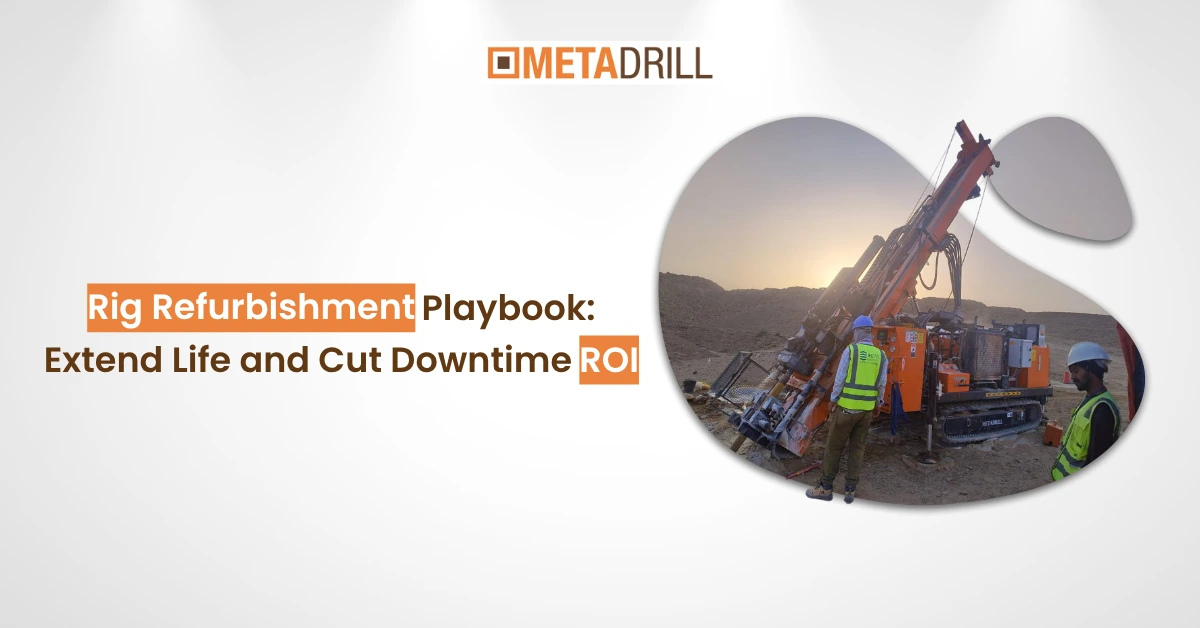
Unplanned stoppages destroy margins. A large reliability survey found that the typical industrial outage costs a lot, and most plants still experience at least one unplanned stop each month, proof that a preventive program outperforms “fix it when it breaks.”
What “Refurbishment” Means Here
Our program is a full reset of our own fleet; we only refurbish our own drills. That matters for standards and traceability. By controlling history, parts, and procedures end-to-end, we can run geotechnical drill rigs refurbishment with fewer unknowns, deliver consistent drilling rig refurbishment results, and keep every record tied to a known serial number. The same discipline powers geotechnical drilling equipment refurbishment across substructures, masts, rotary systems, hydraulics, electrics, and the small but critical drilling rig tools that make or break a shift.
The Five-Stage Flow
Scope & baseline
Pull lifetime logs, NDT history, torque curves, vibration trends.
Define the unit’s post-refit role (lead, support, training).
Lock the punch list for geotechnical drill rigs refurbishment, geotechnical drilling equipment refurbishment, and companion drilling rig tools.
Strip-down & inspection
Disassemble mast sections, rotary/top drive, gearboxes, pumps, and control panels.
Dimensional checks on wear faces; MPI/UT on high-stress welds and joints.
Drill string & accessories inspected as per defined standards (visual + periodic NDT on pipe, collars, stabilizers, subs).
Component overhaul
Gearboxes: bearings/seals replaced; backlash recorded.
Hydraulics: cylinder reseal; hose sets to spec; reliefs set and tagged.
Electrical/HMI: harness re-loom; corrosion points replaced; e-stop verification.
Drilling rig tools: reface/recut threads, install new slips/elevators as needed; torque devices are calibrated.
Rebuild & performance test
Reassemble to OEM torque values with color-tagged fasteners.
Dynamic mast load test; brake holding force check.
Rotary/top-drive RPM and torque validation; thermal and cavitation checks.
Certification & handover
Update as-built drawings, serial logs, NDT records, and maintenance plans.
Train crews on revised limits and inspection cadence.
Schedule 50/100-hour post-commission checks.
Upgrades That Move The Uptime Needle
Power & hydraulics
Variable-displacement pumps with load-sensing valving reduce heat and stabilize responses.
Case drains and high-beta filtration protect pumps and control blocks.
Structure & drive
Mast pin/bushing kits; lattice crack repairs with documented NDT sign-offs.
Rotary/top-drive shafts and bearings replaced; runout tolerances reset.
Controls & electrics
HMI alarm logic for RPM, pressure, temperature; CAN bus cleanup to remove phantom faults.
LED work lights, improved ingress protection, and proper earth bonding.
Drilling rig tools package
Recertified tongs; new slips/elevators as needed; torque-turn systems calibrated.
Re-hardfaced stabilizers; fresh subs/pup joints where wear exceeds tolerance.
These upgrades are baked into every drilling rig refurbishment we run and mirrored across geotechnical drill rigs refurbishment cycles so behavior is predictable from rig to rig. Companion geotechnical drilling equipment refurbishment ensures accessories don’t become the weak link, while healthy drilling rig tools keep threads, torque, and safety where they belong.
A Preventive Cadence That Keeps Gains Compounding
Daily: walk-downs, leak checks, fastener paint marks, and drilling rig tools inventory.
Weekly: grease schedule; strainers/screens; breather checks; belt/chain tension.
Monthly: vibe analysis on rotary/gearboxes; oil sample; brake-holding test; API-style drill string review.
Quarterly: alarm and e-stop function tests; hot-oil endurance checks.
Every task lives in our CMMS, so geotechnical drill rigs refurbishment benefits remain visible in uptime and footage/day. The same calendar governs geotechnical drilling equipment refurbishment and routine care for drilling rig tools.
ROI Focused
The return is obvious in time saved and schedules kept. Refurbishment removes failure modes, cuts emergency callouts, and stabilizes performance so planning sticks. Industry research consistently shows that predictive and preventive programs can cut unplanned downtime, the difference between finishing a program on time and slipping bids.
Pitfalls to Avoid
Paint-over “refurbs”: cosmetics without gearbox/hydraulic work just postpone failures.
Parts roulette: off-spec hoses and seals raise temps and leak rates, standardize BOMs.
Paper gaps: if NDT, torque records, or test curves aren’t logged, audits and pre-quals stall.
Tool blind spot: a rig can be refit perfectly and still lose hours if drilling rig tools are worn or out of calibration.
Shop-floor Checklist
Mast pins/bushings changed; crack NDT signed
Rotary/top-drive bearings & seals; runout recorded
Hydraulics resealed; reliefs set; oil sample baseline
Electrical looms rebuilt; HMI alarms verified
Drilling rig tools recertified; torque system calibrated
API-style drill string inspection log updated
50/100-hour post-refit inspections scheduled
You can also check: Hollow-Stem Augers & SPT: Essential Tools for 2025
Final word
If you want fewer surprises and steadier output, run a disciplined drilling rig refurbishment cycle on your own assets, then defend the baseline with a preventative cadence. Pair that with consistent geotechnical drill rigs refurbishment intervals, targeted geotechnical drilling equipment refurbishment, and vigilant care of drilling rig tools, and you’ll extend service life while cutting downtime risk. The data backs it up: outages are expensive, and structured maintenance can significantly reduce them.
Question to the public:
Cut outages and costs with disciplined drilling rig refurbishment. Five-stage rebuilds, CMMS-backed maintenance, and certified tools boost uptime & safety.